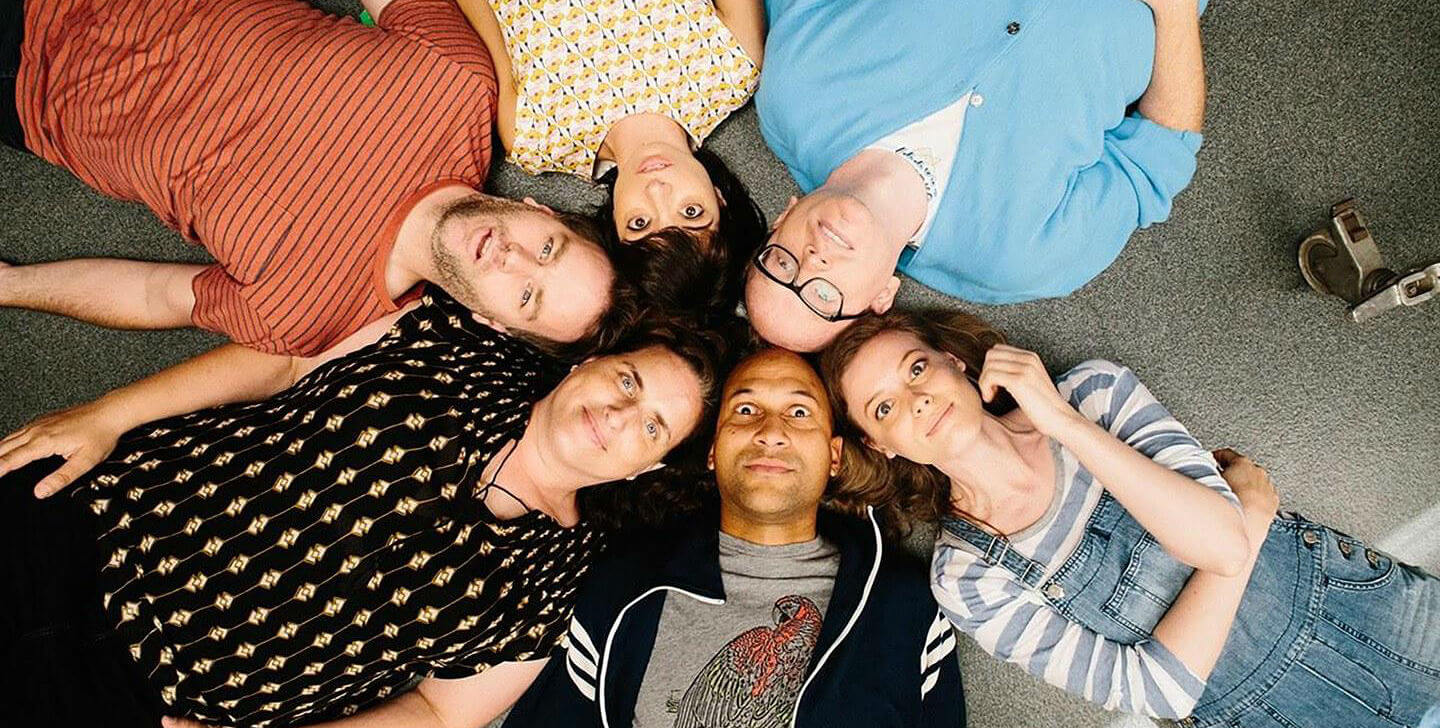Don’t Think Twice [2016]: Facing the loss of their home base and the sudden success of a colleague, a small New York improv troupe grapples with life, loss, and the sting of professional failure in comedian Mike Birbiglia’s second feature Don’t Think Twice.
“Say Yes” Despite their history as a launchpad for vital comic talent, improvisational comedy troupes often earn the kind of condescension reserved for celebrity impressionists or ultra-specific cover bands. Broad City’s ‘Statutory Crepes’ and Bojack Horseman’s seafaring cult of comedians suggest that even writers and performers with backgrounds in improv consider it worthy of occasional ridicule. Throughout Don’t Think Twice, sophomore Director Mike Birbiglia crafts a far more sympathetic, though not uncritical, look at the particular personalities drawn to improv and shaped by its sometimes paradoxical mix of intimacy and in-fighting. The film's tone, a continually surprising blend of the tragic and comic, echoes this central paradox. The results are mostly successful.
As with his debut, Sleepwalk With Me, Birbiglia directs himself as an actor. Though similarly personal material surely informed this film, it could hardly be mistaken for the product of another one-man show. Birbiglia’s Miles, a 36-year-old improv instructor and founding Commune member, shares the stage and screen with another five gifted and ambitious comedians. Miles’ comrades, many of whom share a dorm-like apartment with their embittered pal, include: Jack (Keegan-Michael Key), the group’s most charismatic presence and a bit of a showboat; Sam (Gillian Jacobs), wary of the spotlight and presenting the film’s fiercest arguments for improv’s purity; Bill (Chris Gethard), an insecure comic whose demeanor and experiences place Gethard well within his wheelhouse; Lindsay (Tami Sagher), financially secure thanks to a pair of loaded parents; and Allison (Kate Micucci), a cartoonist as well as a comedian. Each character’s behavior proves both charming and, more interestingly, pathetic depending on the circumstances. Though far from a feature-length exercise in discomfort, the film reaches queasy excellence whenever The Commune’s talents and ambitions look more self-defeating than self-aware.
“I’ve Got Your Back” According to an early voiceover, the cardinal rules of improv include the adage, “It’s all about the group.It’s not about you looking funny.” This guideline seems crucial to Birbiglia’s efforts as both writer and director.His most dynamic filmmaking coincides with his characters’ performances on stage. During these sequences, the camera moves about the stage in such a way as to subtly suggest that it, too, is tuned to the unpredictable rhythms of improvisation. The jokes are believably hit-and-miss, but the troupe’s obvious enthusiasm elevates the performances considerably. I can hardly recall a film about comedians, improvisational or otherwise, that featured shows this believable, or this consistently appealing. Elsewhere, off-stage, Birbiglia lets his camera linger as his characters do what they do best, make themselves and each other laugh. Though these sequences inevitably call to mind the insufferable ‘improvised’ segments that fill each new Judd Apatow production, they prove infinitely more enjoyable. The Commune’s conversational rapport suggests a shared history and provides a unique sort of characterization. Whether suffering through an uncomfortable road trip or appraising what passes for television comedy, Birbiglia’s characters come across like real friends experiencing real success and failures. Instead of needlessly extending the film’s running time, the film’s most shaggy moments prove its most essential.
In many instances, Miles, Sam, and company crack jokes to distract each other from hardships both professional and personal. Any viewer can see that they each prefer to handle such things as a group. Predictably, sequences focused on individual characters are rarely as satisfying as more crowded ones. Birbiglia’s efforts to provide all six Commune comedians with their own distinct narratives are certainly admirable. By juggling individual narrative arcs, he subverts the typical presentation of comedy troupes. This group is not a cult of interchangeable performers, but a rapidly evolving collection of comedic sensibilities. His script cannot, however, help but read as simultaneously undercooked and overstuffed. Several characters disappear in spite of Birbiglia's best efforts. Sagher, for example, has a whole lot of screen and almost nothing to do. We spend a great deal of time watching Allison smoke pot but learn almost nothing else about her. Her smoking habit and family money, evidently, tell us all we need to know. The number of uncomfortably intimate and revealing moments we share with Miles, Sam, and Bill make such narrative shortcomings all the more conspicuous.
“We are The Commune” With the help its expert cast, Don’t Think Twice distinguishes itself from most of this decade’s comedies thanks largely to Birbiglia’s subtle subversions of the genre’s most predictable narrative beats. Less than ten minutes into the film, The Commune finds itself in the quintessential predicament faced by cinematic performers. Their beloved theater, home for over a decade and the stage for generations of friends, falls victim to Manhattan’s unrelenting real estate market. The usurper’s identity (a name that’s gone from punch line to expletive this year) adds an interesting layer of topicality to the film and further invites our empathy. These characters suffer through the encroachments of a ‘real world’ that audiences should recognize. Birbiglia never idealizes comedy, but he certainly presents the stage as an effective, if imperfect, refuge from a world that constantly disappoints and disillusions. A lesser film (this holiday’s Sing, for example), or a story of artists working in a more typical medium, might see the troupe mount one last show to save the day and vindicate the world of foolhardy dreamers. Don’t Think Twice’s characters abandon this idea immediately. This is not a story about success against impossible odds. It is, instead, the rare comedy that successfully situates itself within the space between ambition and resignation, between hope and despair.
Don’t Think Twice succeeds mostly thanks to the considerable talents of its cast. Birbiglia’s film probably won’t convert the improv-averse, but it should appeal to anyone who has nursed an artistic passion or enjoyed the unique thrill of on-stage collaboration.

